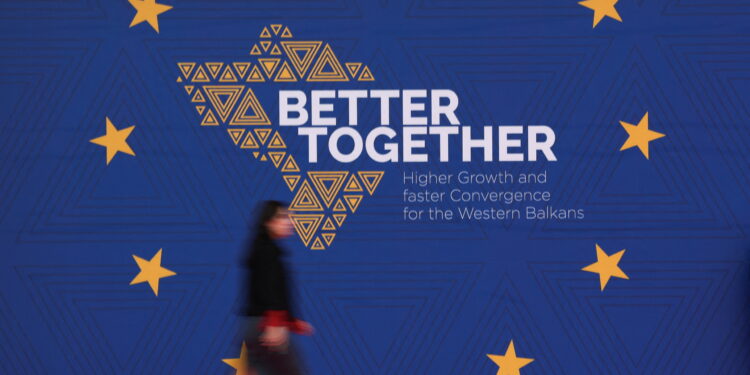Donald Trump and his new administration will reshape US foreign policy towards “America First”. Managing tensions between the United States and China will probably take precedence over European commitments. This raises the question of how the European Union can secure its neighbourhood with less US involvement, specifically in the Western Balkans.
Since the dissolution of Yugoslavia in the 1990s, the Western Balkans – Albania, Croatia, Bosnia and Herzegovina, Kosovo, Montenegro, North Macedonia, and Serbia – have embodied a delicate balance between vulnerability and strategic value. The region is close to the EU. It is the crossroads between East and West. But the Balkan route serves as a pathway for both irregular migration and drug trafficking. The wars that ravaged the region left deep scars, particularly in Bosnia and Herzegovina and Kosovo, whose status continues to be undermined by neighbouring Serbia.
As the United States retreats from the region, the EU will need to increase its own involvement to prevent a power vacuum that Russia and China could exploit further
Unresolved disputes, combined with economic underdevelopment and rampant corruption, create fertile ground for external actors to exploit. As the US retreats from the region, the EU will need to increase its own involvement to prevent a power vacuum that Russia and China could exploit further. It will also need to convince the US to work with it in the short term to secure the Western Balkans – which can be done. Trump could be persuaded to stay involved in exchange for a greater EU role in the region.
The Trump legacy and future
The first Trump administration prioritised economic cooperation with the Balkans, convinced that this would make past animosities go away. This transactional foreign policy favoured short-term agreements over long-term strategy. Key initiatives aimed at economic normalisation include the 2020 Washington Agreement between Kosovo and Serbia.
However, Trump’s administration showed less interest in promoting democratic values and institutional reforms in the region, weakening the impact of its policies. Further, Trump’s ambivalence toward NATO raised doubts among Europeans about US commitment to European security. Russia and China exploited this perception to strengthen their footholds in the Balkans and undermine the region’s alignment with Western values.
Trump’s return to the White House signals a reduction in Washington’s commitment to NATO. His criticism of NATO and perceived ambivalence toward collective security raises concerns among European allies that they cannot rely on the US to provide a credible deterrent to threats.
EU and NATO memberships
The Ukraine war exposed the EU’s security vulnerabilities. The bloc lacks the capacity to defend its neighbourhood on its own. But it has much else to offer.
The EU and NATO represent aspirational pathways to stability for most Balkan states. However, the slow pace of accession and the EU’s enlargement fatigue have frustrated these ambitions. In 2014, the president of the European Commission, Jean-Claude Junker, declared that there would be no enlargement during his tenure. The priority was to first reform the EU, with a focus on deepening its integration.
Three Western Balkan countries are NATO members: Albania, Montenegro, and North Macedonia. Croatia is the only one to have joined both NATO and the EU. The rest of the countries in the Western Balkans are candidates for EU membership, apart from Kosovo. Montenegro is the furthest along with its application, but progress has been slow, which has created space for Serbia to interfere in its internal affairs and for Russia and China to expand their influence.
Russia is determined to maintain its clout in Europe’s neighbourhood. It meddled in Moldova and Georgia’s elections to try to bring about a favourable outcome. However, nearly all countries in Europe’s immediate neighbourhood desire less Russian influence domestically and more European integration, apart perhaps from Serbia and the Bosnian Serbs.
Russia maintains strong relationships with Serbia and Bosnian Serbs, based on both shared religion and strategic interests. The Kremlin exploits these historical ties to foster anti-Western sentiment and oppose NATO expansion. This allows Moscow to maintain a foothold in the Balkans and impede the Euro-Atlantic integration processes. For Serbia, it is important to keep Russia close because Russia’s UN veto power can prevent Kosovo from becoming a member.
Moreover, in recent years Serbia has rearmed, causing concern among neighbouring countries and sending shivers down the spine of many who suffered Serbian atrocities. Serbia’s defence budget is ten times bigger than Kosovo’s. Its military might surpasses the combined forces of all other former Yugoslav republics.
Serbia claims neutrality, but it aligns with Russia on many issues and recently procured air defence systems from China and signed a free trade agreement. This suggests that Euro-Atlantic institutional membership will not be an incentive for Belgrade. An alternative solution could be to involve the Western Balkans’ three non-NATO members – Bosnia and Herzegovina, Kosovo, and Serbia – in EU defence initiatives. Although the former are already in a working partnership with NATO, membership prospects seem distant for now. EU leaders could also encourage Serbia and Bosnia and Herzegovina (Kosovo is not recognised by either Russia or China) to sever ties with Russia and China, and align their foreign and security policies with those of the EU. Here, conditionality would be a must.
A coordinated transatlantic strategy: “More Europe, less America”
Brussels will need to coordinate with Washington as the latter focuses elsewhere. The US could use its political clout in the Western Balkans to support the EU in taking the lead in bringing the region closer to the EU, regarding both politics and security. Not only will this reduce China and Russia’s influence in the region, but it will also make the EU a safer place.
Although Europe has made strides in defence and energy security, more effort is needed. Many EU states have exceeded the NATO benchmark of spending at least 2 per cent of their GDP on defence. Troops have been deployed to eastern Europe to deter Russian aggression, and strategic frameworks like the Strategic Compass and European Defense Industrial Strategy (EDIP) have been put in place to boost defence capabilities. The EU has even introduced a defence commissioner to coordinate efforts.
The security lens should also be used for stabilisation, especially for Kosovo, and Bosnia and Herzegovina, which are most vulnerable. In Bosnia and Herzegovina, tensions remain high due to the secessionist ambitions of one of its regions, Republika Srpska, backed by Serbia. The EU and US must counter these efforts with targeted sanctions and diplomatic pressure while at the same time uniting in voicing full support for the constitutional order of Bosnia and Herzegovina. Proposals to bring the United Kingdom back into the European Union Force in Bosnia and Herzegovina (EUFOR) and find a creative way to remove Russia’s veto over Bosnia’s security framework offers a potential solution. Alternatively, NATO could establish a peacekeeping framework to replace EUFOR.
Kosovo and Serbia’s unresolved disputes also demand renewed attention. The EU-facilitated dialogue must be reinvigorated, with US involvement to help bridge divisions. Kosovo’s sovereignty and the integration of its Serb community are critical for long-term stability. In September 2023, a Serbian armed militia attacked Kosovo police and killed a policeman in Banjska, highlighting the urgency of addressing security issues in Kosovo and the region.
A coordinated transatlantic strategy would also help counterbalance Chinese influence in the region. The EU must offer alternatives to Chinese investment, including increased funding for infrastructure projects. The last EU and China summit revealed a lack of alignment between the two to check Russia’s aggressive behaviour. China is now helping Russia in its war in Ukraine. This means Beijing is also a culprit in ‘attacking’ European security in the neighbourhood. A unified Euro-Atlantic approach would counter China’s economic and strategic ambitions in the region.
Serbia, in particular, will need to be contained to reduce Russian and Chinese influence in the region. During Trump’s first term, his administration got close to the Serbian president, Aleksandar Vucic. US support for his autocratic, pro-Russian regime will only make matters worse in the Balkans, however. Brussels and Washington will need to be united in order to deny Moscow space to operate in Serbia.
The EU is struggling to deter Russia in its neighbourhood as it stands in its efforts to help Ukraine win the war. In this context, the EU and the US should push the integration of the Balkans in Euro-Atlantic institutions, an unfinished project that started in the 1990s and was led mainly by the US. The EU and the US must strengthen the region’s security to insulate it from the influence of Russia and China.
A Western Balkan future
The Western Balkans’ future lies in closer integration with the EU. Clear accession pathways and tangible benefits will incentivise reforms and maintain the region’s pro-European orientation. Realistic timelines and support would sustain this momentum. Political disputes, such as those in Bosnia and Herzegovina, and Kosovo, must be resolved to enable progress.
Simultaneously, the EU and US should address authoritarian influences and strengthen democratic resilience. A robust transatlantic alliance is key to securing the Balkans’ stability and integration into the Euro-Atlantic community. The region still needs the US in the short term to help push for EU integration in the long run.
The European Council on Foreign Relations does not take collective positions. ECFR publications only represent the views of their individual authors.
Source link : http://www.bing.com/news/apiclick.aspx?ref=FexRss&aid=&tid=675b0ca1db064461a9de9698ba901160&url=https%3A%2F%2Fecfr.eu%2Farticle%2Famerica-first-europe-next-trump-will-change-dynamics-in-western-balkan-security%2F&c=6651913582479816756&mkt=en-us
Author :
Publish date : 2024-12-12 02:16:00
Copyright for syndicated content belongs to the linked Source.












